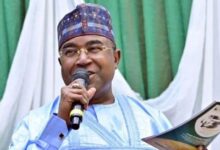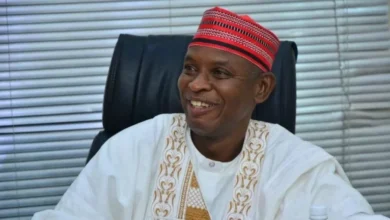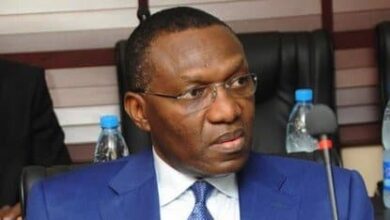FG to support Dangote Refinery’s 1.4m barrels daily production – Lokpobiri

Minister of State for Petroleum Resources (Oil), Heineken Lokpobiri, says the Federal Government will fully support Dangote Refinery in achieving its 1.4 million barrels-per-day refined products target.
Lokpobiri said this on Monday in Lagos during his welcome address at the 19th Africa Downstream Energy Week.
The theme of the event is “Energy Sustainability: Growth Beyond Boundaries and Competition”.
“I received the good news that the Dangote Refinery is expanding its capacity to 1.4 million barrels per day.
“That will not just save Nigeria or West Africa, it will save Africa and, indeed, make an impact globally.
“The Federal Government will support him all the way to accomplishing that goal,” he said.
The minister described the refinery’s expansion plan as a major milestone for Africa’s energy independence and a validation of the government’s policy direction under President Bola Ahmed Tinubu.
Lokpobiri explained that the removal of fuel subsidy and the liberalisation of the downstream petroleum sector were key policy decisions aimed at creating a viable environment for private sector investment.
“The main reason President Tinubu announced the removal of fuel subsidy on his first day in office was because, with subsidies, the private sector could not grow.
“The downstream can only thrive when the right business environment allows private capital to flow in, invest, and maximise opportunities.
He noted that while some Nigerians initially misunderstood the policy, it has now led to a more stable and competitive petroleum products market.
“With deregulation and liberalisation, there is now healthy competition. Prices are stable, availability has improved, and products are more accessible and affordable despite challenges,” he said.
Lokpobiri stressed that if the government had not removed subsidies, Nigeria’s energy sector would be facing severe difficulties today.
The minister reaffirmed the Federal Government’s commitment to deepening investment in the oil and gas sector, saying the global conversation on energy transition is gradually shifting to a more balanced perspective that recognises the continued importance of hydrocarbons.
“The world has realised that energy transition cannot happen in a vacuum.
“Even as we pursue cleaner sources, the global economy still depends on oil and gas.
“Without substantial investment in these resources, there will be no financial capacity to fund the energy mix we all desire,” Lokpobiri noted.
Citing recent United Nations reports, Lokpobiri said the world needs to invest about $540 billion annually in oil and gas recovery and related infrastructure to meet growing energy demand and ensure global energy security.
He added that discussions on climate change and net-zero emissions remain relevant, but the realities of global population growth and consumption patterns make it clear that hydrocarbons would continue to play a central role for decades to come.
“Africa, with a population exceeding 1.4 billion people, cannot afford to ignore investment in oil and gas.
“Expanding exploration, production, and refining capacity is crucial not only for self-sufficiency but also for the continent’s economic stability,” he said.
Lokpobiri noted that Nigeria’s downstream sector is gradually stabilising following the removal of subsidies, with improved product availability and increased investor confidence.
The minister said, “Subsidy was not sustainable; it discouraged private investment and placed a heavy burden on government finances.
“What we are seeing today is a more competitive environment that promotes efficiency and private participation.”
He commended President Tinubu for taking decisive policy actions that have repositioned the downstream sector for long-term growth and sustainability.
“It takes a courageous leader to make decisions that may be unpopular today but are necessary for the country’s future,” he added.
The minister also reaffirmed that ongoing reforms in the oil and gas industry aim to ensure energy security, encourage domestic refining, and foster private sector participation across the value chain.
“We are no longer just talking about transition; we are building an energy mix that guarantees security for Africa,” Lokpobiri said.
“Every stakeholder must align with this vision to create the Africa we want.”
Also speaking, the Chairman of the Advisory Board of OTL Africa Downstream Energy Week, Adetunji Oyebanji, called for renewed collaboration, policy consistency, and innovation to drive Africa’s energy sustainability and competitiveness in a rapidly changing global landscape.
Oyebanji said that the conference underscored the need for Africa and Nigeria to look beyond conventional limits and create an energy future anchored on integration, inclusiveness, and responsible growth.
He described the OTL Africa Downstream Energy Week as a bridge between policy and practice, bringing together regulators, operators, investors, and innovators to shape the future of Africa’s downstream energy industry.
“Energy sustainability is not merely about preserving resources; it is about ensuring that our growth today does not compromise the prosperity of tomorrow.
“We must build an industry that is competitive, responsible, and adaptable to a rapidly changing global environment,” he explained.
Oyebanji, the former Chairman of the Major Energy Marketers Association of Nigeria (MEMAN), observed that the global energy sector had been undergoing major shifts, driven by geopolitical tensions, supply uncertainties, and the accelerating march toward energy transition.







